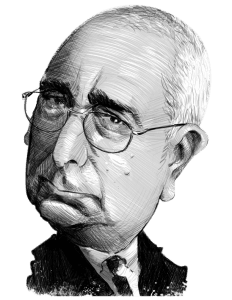Long ago and far away, there was a more or less endless series of wars between Israel and the surrounding Arab states. Israel was wildly outnumbered by its enemies. The then–Soviet Union had supplied the Arab states with top-of-the-line modern weaponry.
READ MORE from Ben Stein: American Faces
Yet, Israel won every war with smashing victories. After the most recent one, the so-called “Yom Kippur War,” in 1973, the Arab states punished Israel and its only friends on this earth, namely Richard Nixon and his USA. They did this by slapping a tight oil embargo on the USA.
Oil is as vital a commodity as there is on earth. “Fracking” — which would free the USA from Arab oil blockades — had not yet been fully developed. Thus, the price of oil shot up more or less overnight, especially in the oil-producing and oil-consuming states like our beloved America.
Almost everything we use in America has at least some oil in it, from gasoline to microwave popcorn to steak to chicken. The price of almost everything rose, sometimes dramatically.
Thus came inflation on a titanic scale throughout the Western world. And it fed upon itself. As prices rose, workers demanded more pay. They got it, and wages and prices went up rapidly. No one wanted to be the perceived hard-hearted enemy of the American family. Then on and on.
But what to do, what to do?
The standard refrain was that the government was running up immense deficits. These came out as high demand for goods and services.
In essence, the government, by running immense debts, was borrowing from our kids and grandkids to buy anything in the showroom. Demand was not only raised but multiplied. The big question was how to slow it down without creating a severe relative drop in demand, and thus another Great Depression, which was the ultimate bad thing in peacetime American history.
So, what to do? What to do? What did we want? Basically, a slowdown in growth but not a cratering crash. That was the very last thing we wanted.
It was largely a psychological issue. If the American people were certain that there would be a slowing down of demand growth but not a jolt, especially not a jolt that kept on jolting downward, or forcing down prices endlessly, the economy could and would revive.
That is, if manufacturers (for example) knew that the price of their ingredients would stay steady for a long time, and if their consumers were expecting stable prices, the manufacturers would not feel the need to raise prices. There would be no expectations of rising prices. A new dynamic would develop in the marketplace. And instead of prices rising to pay higher profits to owners, owners would attempt to lift profits by manufacturing (or growing or extracting) more efficiently.
This would be a “virtuous cycle,” stoked with better processes and better products for the same or lower prices. If you think of the high-tech industry and its miracles of semi-conductor production, you get the basic idea.
How would we get to this lovely spot on the economic globe?
We got to this unfortunate spot where we now find ourselves because of desperate fears that COVID-19 would create so much unemployment that we would have a depression. To counter this fear, ginned up in the world by commentators and “scientists,” the government would have to throw bales of currency out of the doors of helicopters to the starving mobs.
The government tried this by a plethora of social welfare programs. These did the equivalent of tossing money out of airplane doors. But this worked too well. There was no depression. There was not even much evidence of a mild recession.
But, meanwhile, the country was being flooded with cash. An equivalent program was that the government would drastically lower interest rates. That made it much more affordable for Americans to buy cars, washing machines, farmland, and especially homes. The natural result was that prices rose — and rapidly. That threw a scare into the economy. The government tried to toss the gears of the economy into reverse by allowing interest rates to rise — and not by a small amount.
The government also slowed drastically its “social welfare” programs. That meant a river — instead of Noah’s flood — of money ran into the economy.
But the political pain of (for instance) trying to soak up money by raising taxes or cutting out social welfare programs to supposedly help the poor was too much to be tried.
And so we had — and have — immense federal deficits, created by the well-meaning government. And thus we had — the standard definition of inflation — too much money chasing too few goods.
As any grocery shopper or homebuyer or refinancer knows, we still have higher prices than we wanted to have.
How will it stop? My father, the economist, Herbert Stein, created “Stein’s Law,” which says that “if something cannot go on forever, it will stop.”
In our beloved America, we are having that happen right now. The hundreds of millions of Americans stunned at the checkout line at the grocery store will buy less meat or cheaper cuts of meat or fish. And so we have food store department heads telling their meat and fish buyers to buy lower priced cuts. We have housewives buying ground round instead of steak.
And we have its own built-in brakes slowing the truck of the economy.
At least that’s how it’s supposed to work. And it always has so far. And thus, maybe, probably, the thing that cannot go on forever — ultra-high inflation — will stop.
Image: This file is licensed under the Creative Commons Attribution-Share Alike 3.0 Unported license. Attribution: IDF Spokesperson’s Unit.




